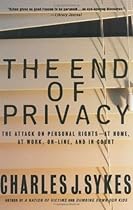Read The End of Privacy: The Attack on Personal Rights at Home, at Work, On-Line, and in Court by Charles J. Sykes Online
[Charles J. Sykes] ✓ The End of Privacy: The Attack on Personal Rights at Home, at Work, On-Line, and in Court Î Download Online eBook or Kindle ePUB. The End of Privacy: The Attack on Personal Rights at Home, at Work, On-Line, and in Court But in the face of computer, video, and audio technology, aggressive and sophisticated marketing databases, state and federal “wars” against crime and terrorism, new laws governing personal behavior, and an increasingly intrusive media, all of us find our personal space and freedom under attack.In The End of Privacy, Charles Sykes traces the roots of privacy in our nation’s founding and Constitution, and reveals its inexorable erosion in our time. Sykes concludes by sugg

| Title | : | The End of Privacy: The Attack on Personal Rights at Home, at Work, On-Line, and in Court |
| Author | : | |
| Rating | : | 4.44 (538 Votes) |
| Asin | : | 031226318X |
| Format Type | : | paperback |
| Number of Pages | : | 288 Pages |
| Publish Date | : | 2015-02-09 |
| Language | : | English |
From Publishers Weekly Sykes (A Nation of Victims) provides a timely analysis of the challenges to privacy posed by technological change, media aggressiveness, governmental and business intrusion and even our own propensity to share information about ourselves. As he looks at both governmental and private-sector encroachments on individual privacy, Sykes comes to the conclusion that, rather than wait for government to rein itself in or regulate the private sector, individuals should be more vigilant about their privacy. Sykes finds that privacy is far more respected in Europe, where stringent regulations limit intrusions. In today's "surveillance society," Congress has refused to regulate clandestine workplace videotaping or the disseminati
You're being monitored for your own safety. B. Freeman At some point in each of our lives, we think that others have too much information about us. We've heard about movies like "Enemy of the State" and "The Net" and we've watched "60 Minutes" report on surviellence networks like "Echelon." We also know that cellular phones are not always the safest medium to impart confidential information. For those of you who are concerned about privacy issues, this book is for you.Sykes does a good job examining all of the potential ways that people go about "exposing" themselves to the outside world. His message is that technology has a dark underbelly, and when used by the "wron. "Another hit!" according to A Customer. I discovered Sykes when I read "Nation of Victims" several years ago. Interestingly, another book by a different author with the same name "The End of Privacy" was released about the same time as Sykes' "End of Privacy" by Reg Whitaker.Sykes is more in line with my own concerns regarding privacy as well as the even more compelling issue which is the threat to freedom posed by intrusive tracking technologies.The ultimate horror will occur when this technology, matures and riding on a universal netted infrastructure eventually replaces paper currencies, which are still nominally anonymous, with a digital system whic. john r rice said An alarmist position. This book presents a very alarmist view about the implications of technology for privacy. I found it to be one sided, for example, bad things that technology might develop are presented but good things that counter them are not presented. It will appeal to those who are looking for pessimism about technology but those who are looking for the pros and cons of technology developments will be disappointed.
But in the face of computer, video, and audio technology, aggressive and sophisticated marketing databases, state and federal “wars” against crime and terrorism, new laws governing personal behavior, and an increasingly intrusive media, all of us find our personal space and freedom under attack.In The End of Privacy, Charles Sykes traces the roots of privacy in our nation’s founding and Constitution, and reveals its inexorable erosion in our time. Sykes concludes by suggesting steps by which we might begin to recover the territory we’ve lost: our fundamental right to our own lives.. From our homes and offices to the presidency, Sykes defines what we have lost, citing example after example of citizens who have had their conversations monitored, movements surveilled, medical and financial records accessed, sexual preferences revealed, homes invaded, possessions confiscated, and even lives threatened—all in the name of some alleged higher social or governmental good. As Justice Louis Brandeis suggested more than a century ago, privacy—the right to be left alone—is the most valued, if not the most celebrated, right enjoyed by Americans
Download The End of Privacy: The Attack on Personal Rights at Home, at Work, On-Line, and in Court
Download as PDF : Click Here
Download as DOC : Click Here
Download as RTF : Click Here
